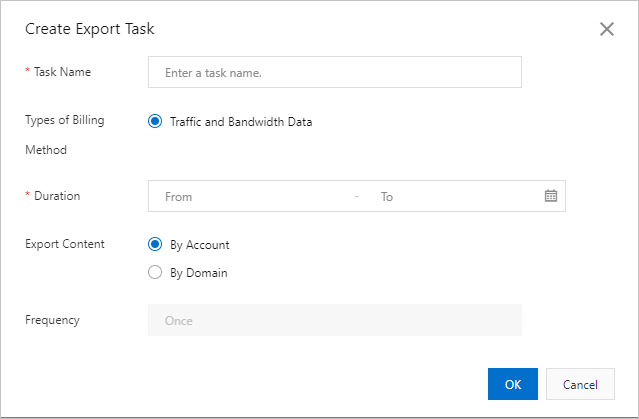Usage statistics allows you to query the usage of resources, such as the streaming bandwidth and traffic, number of ingested streams, and transcoding and recording duration. This topic describes how to view the usage details of your ApasaraVideo Live resources.
Time granularity
You can query resource usage in the ApsaraVideo Live console or by calling API operations. However, the maximum time range that you can query and the maximum period of time within which historical data is available are different:
Time granularity | Maximum time range per query | Historical data available | Data delay |
5 minutes | 3 days | Last 6 months | 15 minutes |
1 hour | 31 days | Last 6 months | 4 hours |
1 day | 31 days | Last 6 months | 04:00 on the next day |
Query resource usage details
ApsaraVideo Live console
Log on to the ApsaraVideo Live console.
In the left navigation pane, choose .
View the usage of resources.
You can select a domain name, a region, and a time range to view the usage of the following resources. ApsaraVideo Live provides the following preset time ranges: today, yesterday, last 7 days, and last 30 days. You can also specify a custom time range.
Tab
Description
Streaming Bandwidth/Traffic
Displays the traffic and bandwidth usage of a specified domain name.
Ingested Streams
Displays the number of ingested streams for a specified domain name.
NoteThe number of concurrent streams is equal to the total number of inbound source streams and transcoded streams.
Transcoding Duration
Displays the transcoding duration for different specifications.
NoteFor information about the definition of a transcoding specification for billing, see the Transcoding specifications for billing section of this topic.
Live Stream Recording
Displays the number of live recording channels and the length of container format conversion for a specified domain name in a specified region.
Snapshots
Displays the number of snapshots for a specified domain name.
Content Moderation
Displays the number of live stream moderation jobs.
Time Shifting
Displays the duration and data volume of time shifting for a specified domain name.
Stream Relay
Displays the usage of edge stream relay and live center stream relay.
Production Studios
Displays the streaming output duration of production studios for a specified domain name.
Stream Delay
Displays the duration of stream delay for a specified domain name.
DRM Calls
Displays the number of Digital Rights Management (DRM) calls for a specified domain name.
Details Export
Allows you to export traffic and bandwidth usage details for your account or based on domain names.
API operations
For information about how to call API operations to query resource usage details, see Statistics-Usage.
Transcoding specifications for billing
You are charged for transcoding based on the transcoding resolution, transcoding type, and duration. A transcoding specification is determined by the transcoding resolution and transcoding type.
Transcoding types:
H264NBHD: Narrowband HD™ transcoding based on H.264
H265NBHD: Narrowband HD™ transcoding based on H.265
AUDIO: audio transcoding
Examples of transcoding specifications:
SD_H265NBHD 6 Minutes: The transcoding resolution is 720p (SD), the transcoding type is Narrowband HD™ H.265, and the transcoding duration is 6 minutes.
2K_H265NBHD 3 Minutes: The transcoding resolution is 2K, the transcoding type is Narrowband HD™ H.265, and the transcoding duration is 3 minutes.
SD and 2K in the preceding examples indicate the transcoding resolutions in terms of billing. They may not exactly be the actual video resolutions. For more information, see Billing of live stream transcoding.
What to do next
To export resource usage data, perform the following steps:
Click the Details Export tab.
Click Create Export Task.

In the dialog box, enter the task name, select a time range, and select By Account or By Domain.
NoteIf you select By Domain, you can select up to 100 domain names.
Click OK.